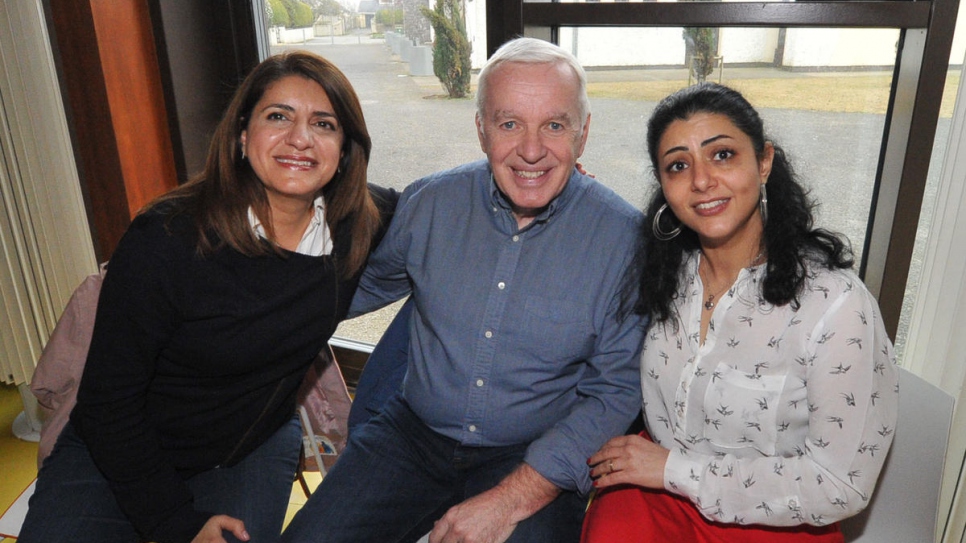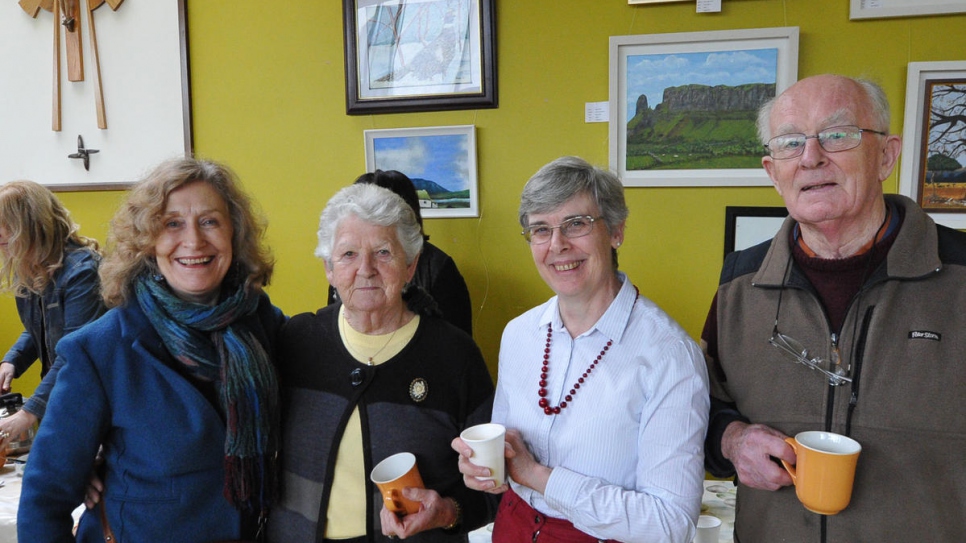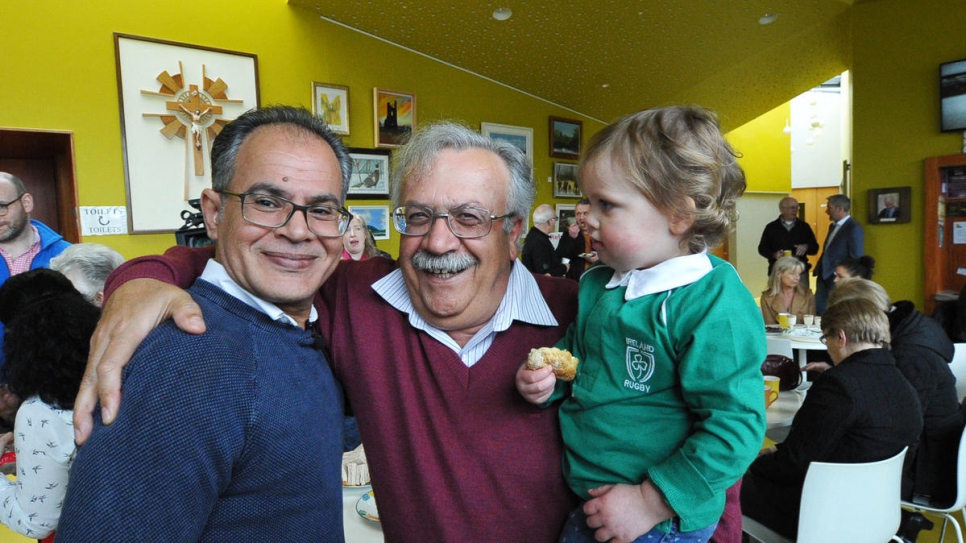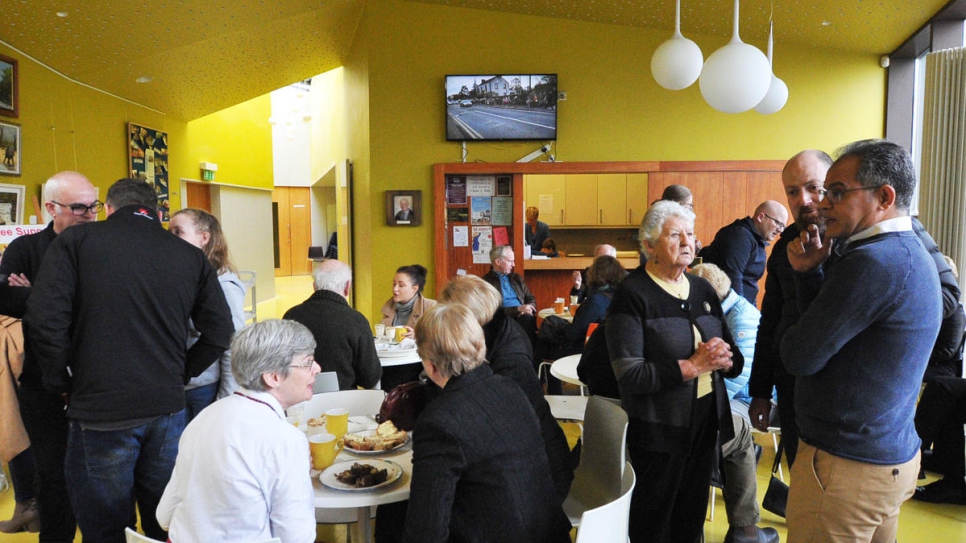Irish woman sets up community programme to help refugees
An Irish woman pilots the country's first sponsorship programme to help welcome refugees into the community in her small town.
Nola Leonard (second from right) welcomes Syrian family (from left), Angham, Lorca and Zuhair Fakir, to their new hometown, Dunshaughlin, County Meath.
© UNHCR/Seamus Farrelly
It was more than just the drip drip of news that spurred Nola Leonard to take action to help refugees in her home country of Ireland. Through her faith, she was inspired to make a difference in her small town of Dunshaughlin, north of Dublin, by a global call from the Pope.
“It had been on my mind for a long time. The terrible situation of Syrian refugees and all the people in the Mediterranean, you couldn’t bear to hear another news item about it,” she says.
“Then I read about Pope Francis … taking a Syrian family into the Vatican and calling on every parish in the world to take in a refugee family. It was just before the Pope’s visit to Ireland (in 2018) and I thought, that could be a way to help.”
"I thought, that could be a way to help."
Six months later, her town becomes the country’s first to pilot a programme that gives Irish towns and villages a platform to sponsor refugee families. The government will launch its Community Sponsorship Programme on Wednesday, supported by UNHCR, the UN Refugee Agency. The programme aims to settle a minimum of 50 people by September and research in other countries shows the programme helps refugees to integrate successfully.
In traditional refugee resettlement models, the state provides settlement and integration services directly to refugees. Under the new scheme, groups of private citizens become the face of welcome for new arrivals. Sponsors commit to providing financial, emotional and settlement support to help newcomers as they settle into their new communities.
Once Nola got started, she found many others in her community wanted to help refugees.
“So many people were supportive,” she says. “One person offered an apartment, another did a bus timetable for an information booklet which included information on where to buy Arabic food and find work. There is a job for everybody and everybody took a job.”
Local companies offered financial support while a group was formed to create the sponsorship committee.
“When my wife said they were thinking of helping a family, I really wanted to help,” says Colm O’Connor. He worked in the Middle East in the 1960s and once was driving through northern Syria when a friend came down with malaria. A local family insisted on taking him in to their house until his fever settled.
“The only images we see are the destruction. But I only remember the humanity and the person to person contact that saved our friend. It motivated me to always think of the people and not necessarily the politics.”
Last December, Ireland, along with 180 other member states of the UN General Assembly, voted for an historic new international framework, known as the Global Compact on Refugees, that is transforming the way the world responds to mass displacement and refugee crises. One aim is to strengthen international refugee responses by better sharing responsibility including through the provision of more resettlement and other opportunities for refugees to travel safely.
“The establishment of this new programme in Ireland, and the arrival of the first family here, sets a powerful example to other states seeking to realise the vision of the Global Compact on Refugees,” says Enda O’Neill, Head of Office, UNHCR Ireland.
“Resettlement has always played a critical role in offering protection and a solution to some of the world's most vulnerable refugees identified by UNHCR. It is also about easing pressure on the developing countries that are hosting the majority of the world's refugees. In this way, resettlement and other pathways such as community sponsorship are a demonstration of solidarity and responsibility sharing at all levels of society."
“So many people were supportive."
In December, the community in Dunshaughlin welcomed the Fakir family, who are Syrians who were living in Lebanon.
“Until the moment we landed, we didn’t know what to expect,” says Zouhair Fakir. “But … Nola and the other members from the Community Group met us off the plane and we started our new life.”
A TV producer, Zouhair worked on many popular TV programmes in the Middle East, including Talk of the Town and entertainment shows such as the Arabic version of the well-known French programme Taratata. However the situation was becoming increasingly difficult eight years after the conflict started.
“I feel freedom for the first time in my life … I feel we are starting our lives as new people,” he says.
Fiona Finn is chief executive of Nasc, an Irish NGO working as a regional support organization for communities who want to become involved in sponsorship. They helped prepare people in Dunshaughlin, building a resettlement plan and showing the community how to navigate bureaucratic elements such as obtaining residency permits.
“All the supports are already in place, including their education needs and housing. They already feel part of the community”, she says.
For Nola, getting involved has opened the possibility of changing more than just the lives of refugees. It has changed her own life too.
“I'm very happy. I'm very proud actually. I think it's probably one of the best things that I've ever done,” she says.





